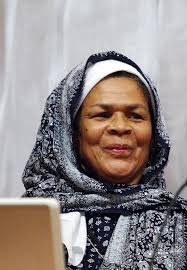Islamic Feminism: Reclaiming Gender Equality within Faith

Islamic feminism, a movement rooted in both faith and social justice, challenges entrenched patriarchal interpretations of Islam to advocate for the equality of men and women as enshrined in Islamic teachings. Unlike secular feminism, which often operates outside the framework of religion, Islamic feminism works within the faith, leveraging textual analysis and historical contexts to demonstrate that gender equality is an inherent aspect of Islam. By reexamining religious texts and challenging traditional interpretations, Muslim feminists argue that the faith itself is not the barrier to equality but rather the cultural and historical practices that have been unjustly attributed to it.
Unpacking the Foundations
 Asma Barlas authored "Believing Women" in Islam: Unreading Patriarchal Interpretations of the Qur'an
Asma Barlas authored "Believing Women" in Islam: Unreading Patriarchal Interpretations of the Qur'anThe Holy Quran, the primary source of Islamic teachings, is often cited as a testament to the inherent equality of all believers. Verses like “Indeed, the most noble of you in the sight of Allah is the most righteous of you” (Quran 49:13) underscore the idea that righteousness, not gender, determines an individual’s worth in Islam. However, patriarchal interpretations of a handful of verses have historically been used to justify gender inequality. Scholars such as Dr. Amina Wadud and Dr. Asma Barlas have examined these interpretations, highlighting how male-dominated readings have disregarded the socio-cultural contexts of early Islamic societies. For instance, Wadud’s seminal work, Quran and Woman, provides a hermeneutical approach to understanding the Quran’s stance on gender, demonstrating that equality is a foundational principle rather than an exception.
The Role of Historical Contexts
The challenge of patriarchal interpretations is deeply tied to historical contexts. Early Islamic societies, like many others of their time, were patriarchal. The laws and social norms of those societies influenced how Islamic teachings were interpreted and implemented. Over centuries, these interpretations hardened into doctrines, with cultural norms masquerading as divine mandates. Islamic feminists argue that understanding the context in which certain rulings were made is critical to distinguishing between timeless principles and time-bound practices.
For example, the concept of guardianship (wilayah), often cited to justify male authority over women, was originally designed to ensure the safety and welfare of women in a tribal society. In modern contexts, however, this concept has been misapplied to perpetuate control and deny women autonomy. By revisiting these historical contexts, Islamic feminists seek to dismantle such distortions and advocate for a more egalitarian understanding of Islam.
Faith and Feminism: A Harmonious Coexistence
 Amina Wadud is The Lady Imam and Islamic Scholar. She wrote “Quran and Women” as well as “Inside The Gender Jihad”
Amina Wadud is The Lady Imam and Islamic Scholar. She wrote “Quran and Women” as well as “Inside The Gender Jihad”Islamic feminism is not a contradiction in terms but a synthesis of faith and advocacy for gender justice. Critics often claim that feminism is a Western import, incompatible with Islamic values. However, Muslim feminists counter that the principles of justice, equality, and compassion are deeply embedded in Islamic teachings. By rooting their arguments in the Quran and Hadith (sayings and actions of the Prophet Muhammad), Islamic feminists assert that their advocacy is not about adopting foreign ideologies but about reclaiming their rights within their faith.
The Prophet Muhammad himself is a central figure in this discourse, often cited for his progressive treatment of women. From encouraging women’s education to consulting them on important matters, his actions serve as a model for gender equality. The first convert to Islam, Khadijah bint Khuwaylid, was a successful businesswoman who supported and inspired the Prophet. Other historical figures, such as Aisha bint Abu Bakr, were scholars and leaders, demonstrating that women played pivotal roles in the early Muslim community.
Challenges Facing Islamic Feminism
Despite its strong foundations, Islamic feminism faces significant challenges. One of the primary obstacles is the resistance from conservative clerics and institutions that equate patriarchal norms with religious authenticity. In many Muslim-majority countries, state-sponsored interpretations of Islam often prioritize political agendas over theological accuracy, further entrenching gender inequalities.
Another challenge is the perception of Islamic feminism within broader feminist movements. Often marginalized or misunderstood, Islamic feminists must navigate the dual burden of countering stereotypes about Islam while advocating for gender justice within their communities. This is compounded by the global political climate, where Islamophobia often casts Muslim societies as monolithic and inherently oppressive to women. Islamic feminists reject such reductive narratives, emphasizing that the struggle for gender equality is a universal one that transcends cultural and religious boundaries.
The Way Forward
Islamic feminism offers a transformative vision for Muslim societies. By advocating for ijtihad (independent reasoning) and reinterpreting religious texts in light of contemporary realities, it seeks to create an inclusive and egalitarian framework for all believers. Education plays a crucial role in this process, equipping both men and women with the tools to engage critically with their faith.
Organizations and scholars promoting Islamic feminism are increasingly using digital platforms to disseminate their work. Social media, online lectures, and virtual communities have become vital tools for raising awareness and fostering dialogue. These platforms provide a space for Muslim women to share their experiences, challenge stereotypes, and build solidarity across borders.
Islamic feminism is not just a movement for gender equality but a call to reimagine the relationship between faith and justice. By challenging patriarchal interpretations and advocating a more inclusive understanding of Islam, it empowers Muslim women to reclaim their rightful place within their communities and beyond. The journey is neither simple nor linear, but it is a testament to the resilience and faith of those who believe that gender equality is not just a modern ideal but a divine mandate.




